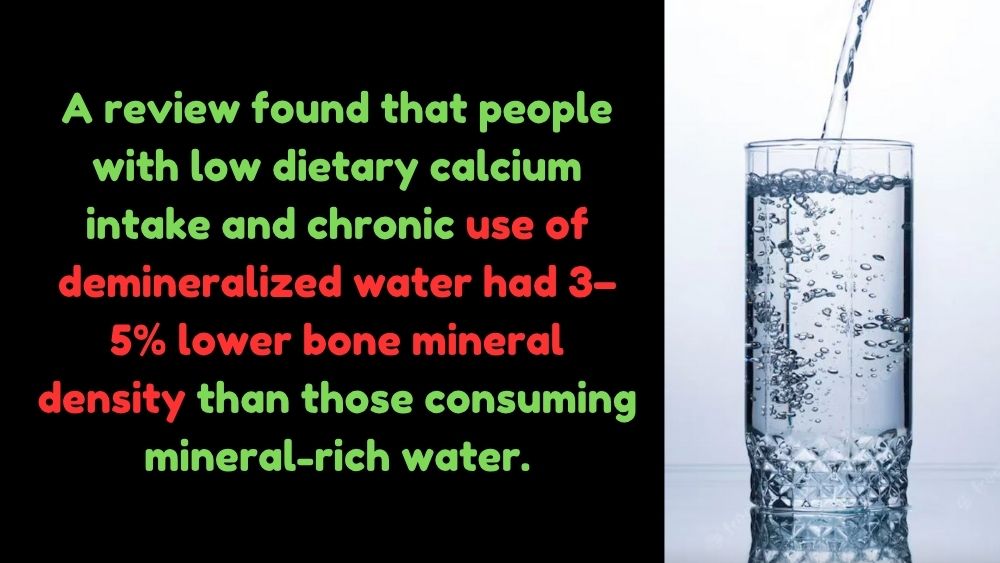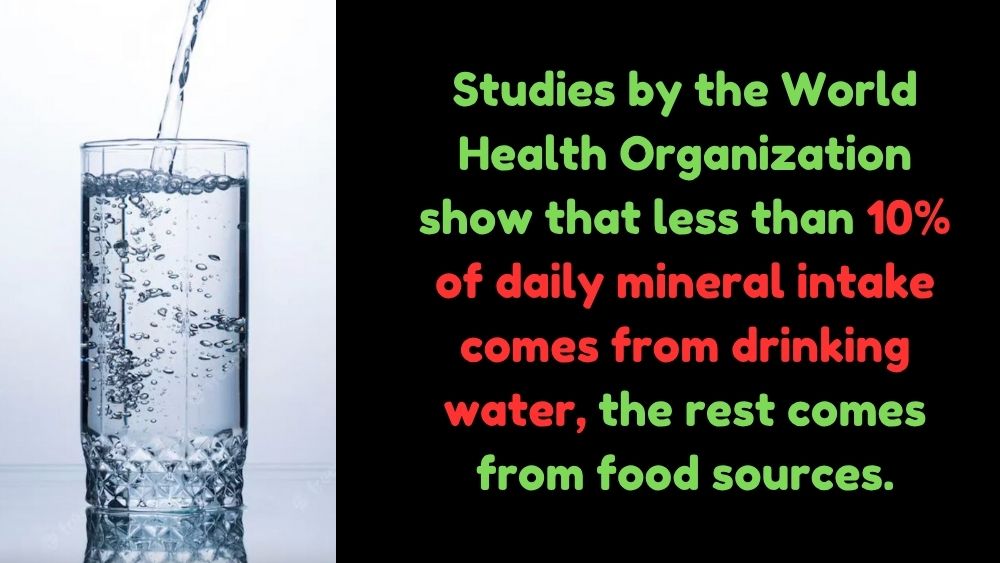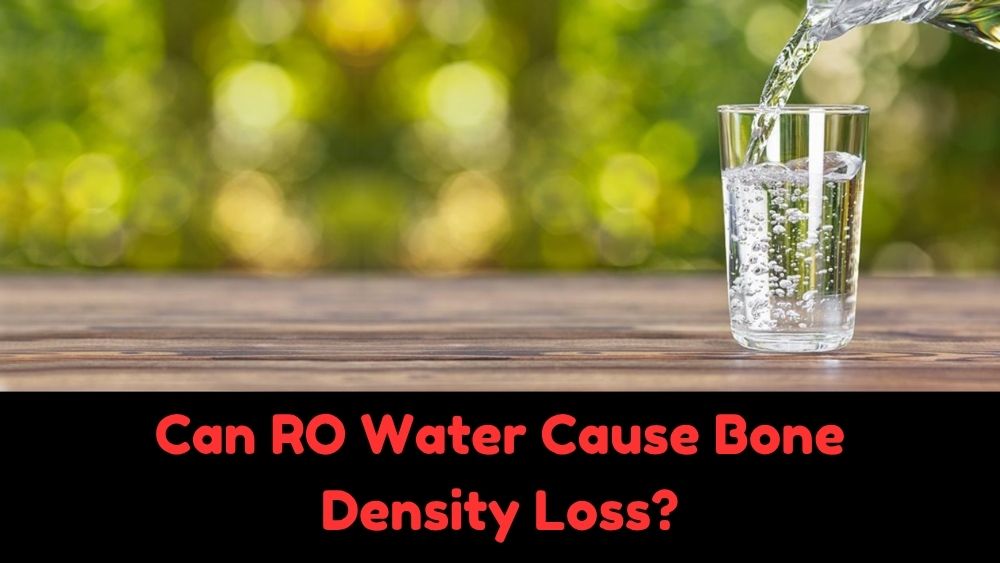Reverse osmosis (RO) systems are among the most popular water purification methods worldwide, removing up to 99% of contaminants from drinking water. But as more people switch to RO systems, a new question arises — can RO water cause bone density loss?
The concern comes from the fact that RO systems not only remove harmful impurities like heavy metals and chlorine but also strip away essential minerals such as calcium and magnesium. Since these minerals are key to maintaining bone strength, some experts argue that long-term consumption of demineralized water could have a mild effect on bone density.
However, scientific evidence suggests that RO water does not directly cause bone loss when part of a balanced diet. The minerals you get from water are minimal compared to what you consume through food. Still, prolonged use of unmineralized RO water might contribute to a lower intake of calcium and magnesium, especially in people with nutrient deficiencies.
Key Takeaways
- RO water does not directly cause bone density loss, but it can reduce calcium and magnesium intake.
- Drinking remineralized or alkaline RO water helps maintain bone health.
- Dietary calcium and vitamin D play a much greater role in bone strength than water mineral content.
- The World Health Organization recommends reintroducing essential minerals into purified water.
- Maintaining proper pH and TDS levels ensures water supports rather than harms long-term health.
Why Minerals in Water Matter
Although most of your calcium and magnesium comes from food, drinking water can contribute a small portion — about 5–20% of daily intake. These minerals not only strengthen bones but also regulate nerve function, heart rhythm, and muscle contraction.
When you drink RO-purified water, these minerals are stripped away by the membrane that filters out dissolved solids. Over time, exclusive consumption of demineralized water could lead to a slight mineral imbalance if your diet is poor or unbalanced.
For example, magnesium deficiency has been linked to lower bone density and increased fracture risk in older adults. The WHO report on “Nutrients in Drinking Water” highlights that low-mineral water may affect calcium metabolism in vulnerable individuals.

How Reverse Osmosis Affects Water Composition
RO systems work by pushing water through an ultra-fine membrane, removing contaminants down to 0.0001 microns in size. This process eliminates not only toxins like arsenic and lead but also essential minerals.
Typical composition comparison:
| Water Type | TDS Level (ppm) | Calcium & Magnesium | Notes |
|---|---|---|---|
| Tap Water | 200–500 | Moderate | Contains natural minerals and salts |
| Bottled Mineral Water | 150–300 | High | Rich in calcium and magnesium |
| RO Water (Unmineralized) | 10–50 | Very Low | Lacks essential minerals |
| RO Water (Remineralized) | 80–150 | Balanced | Ideal for drinking and bone health |
For diabetics, elderly individuals, or those prone to mineral deficiency, remineralized RO water offers a safer balance. You can learn more about post-filtration methods in best alkaline filter for RO.
Can RO Water Really Affect Bone Health?
While some early reports suggested that soft, demineralized water could influence bone metabolism, the overall scientific consensus shows that diet outweighs water in determining bone density.
The National Institutes of Health (NIH) confirms that the majority of calcium and magnesium required for bone maintenance comes from foods like dairy, leafy greens, nuts, and fish — not drinking water.
That said, if someone drinks only unmineralized RO water and consumes little dietary calcium, the cumulative effect could slightly impact bone health over many years. Adding a remineralization cartridge or alkaline filter effectively eliminates this risk.
Understanding the Role of pH and Alkalinity
Unmineralized RO water typically has a pH between 5.5 and 6.5, which is slightly acidic. While this is not harmful by itself, consistent intake of acidic water can cause mild mineral leaching in storage containers and potentially alter the body’s acid-base balance in sensitive individuals.
Alkaline RO water, with a pH of 7.5–8.5, helps neutralize acidity and support bone strength indirectly. Proper hydration also enhances nutrient absorption, further supporting bone metabolism.
To test and maintain healthy pH levels, you can refer to how to adjust pH of RO water.
Expert Opinions
According to Dr. Karen Simmons, a nutrition and bone health researcher, “The impact of RO water on bone density is negligible in people with adequate calcium intake. The concern arises mainly for those with poor diets or pre-existing deficiencies.”
WHO experts also note that reintroducing minerals into demineralized water improves both taste and health outcomes. Many commercial RO systems now include mineral cartridges to restore calcium, magnesium, and potassium.

How to Prevent Mineral Deficiency While Drinking RO Water
- Install a remineralization filter — adds calcium and magnesium back into RO water.
- Eat a mineral-rich diet — include milk, cheese, yogurt, kale, and almonds.
- Check your TDS levels — keep between 80–150 ppm for balanced mineral content.
- Drink adequate water — proper hydration supports calcium absorption and kidney health.
- Test your water annually — ensure your RO system maintains stable mineral balance.
For help maintaining your system, read how to clean and sanitize an RO system.
When to Be Cautious
People at higher risk for bone density loss include:
- Postmenopausal women
- Older adults with low calcium intake
- Individuals with kidney disease or malabsorption disorders
- Those relying exclusively on demineralized water
In these cases, using RO water with mineral enhancement is strongly recommended.
RO Water vs Other Filtration Methods for Bone Health
| Filtration Type | Effect on Minerals | Bone Health Impact |
|---|---|---|
| Reverse Osmosis (no filter) | Removes minerals | May lower intake over time |
| Reverse Osmosis (remineralized) | Adds back calcium, magnesium | Supports bone health |
| Activated Carbon Filter | Retains minerals | Neutral impact |
| Distilled Water | Removes all minerals | Not ideal long term |
| Mineral Water | Natural mineral content | Excellent for bone density |
Among all filtration methods, remineralized RO systems provide the best balance between safety and nutrition.
Balanced Approach for Strong Bones
You can continue to enjoy the purity of RO water without risking bone health by ensuring adequate mineral intake. A simple alkaline or post-carbon filter can restore the natural mineral profile. You may also choose to mix RO water with mineral water occasionally for variety and taste.
Consistent physical activity, sunlight exposure for vitamin D, and a diet rich in calcium are far more influential on bone strength than the type of water you drink.
Key Points Recap
- RO water alone doesn’t cause bone loss — inadequate calcium intake does.
- Always choose remineralized RO water or add an alkaline filter.
- Maintain pH 7.5–8.5 and TDS 80–150 ppm for balanced hydration.
- Diet and exercise remain the primary factors for bone strength.
- WHO and NIH recommend adequate mineral intake alongside purified water.
FAQs
1. Does RO water cause calcium deficiency?
No, not directly. RO water removes calcium from water, but your body’s calcium primarily comes from food. Ensure dietary sources are adequate.
2. Is alkaline RO water better for bones?
Yes. Slightly alkaline water helps maintain pH balance, supports calcium absorption, and prevents mineral leaching from the body.
3. Can RO water weaken teeth and bones?
Not if you maintain proper nutrition. Demineralized water has no direct harmful effect when paired with a mineral-rich diet.
4. Should I add minerals to RO water?
Yes. Installing a remineralization or alkaline filter helps maintain a healthy balance of calcium and magnesium for bone health.
5. What TDS level is ideal for healthy water?
Between 80–150 ppm is optimal for taste, pH, and mineral content — supporting both hydration and bone health.
Conclusion
RO water is safe, pure, and highly beneficial for daily use. It does not directly cause bone density loss, but drinking completely demineralized water without proper nutrition or remineralization can contribute to a slight reduction in mineral intake over time.
The key to healthy bones lies in balance — combine the purity of RO water with a mineral filter and a nutrient-rich diet. With proper pH, TDS, and calcium intake, RO water can be part of a bone-healthy lifestyle. For further insights, see best alkaline filter for RO and is RO water really safe for daily drinking

Hasan Al Sarker is a Reverse Osmosis Specialist. He has worked for many years to ensure safe drinking water for all. His research paper has been published in several journals, including Issue, Medium, and Slideshare. He is recognized as a water doctor among specialists though he did not attend medical college.
Besides working as a researcher of reverse osmosis technology, he is also very fancy with the kitchen and cooking. His guides are reading thousands of people every day. As a head of content, he is responsible for all the published articles at RO System Reviews.

